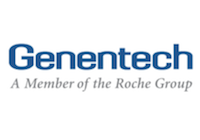Announcing a New Genentech Therapy for ROS1+ mNSCLC and NTRK+ Solid Tumors

Dear Healthcare Professional:
Genentech is excited to share the news of a new FDA approval. ROZLYTREK™ (entrectinib) is now FDA approved for the treatment of adult patients with metastatic non-small cell lung cancer (NSCLC) whose tumors are ROS1-positive.
ROZLYTREK is also FDA approved for the treatment of adult and pediatric patients 12 years of age and older with solid tumors that:
- have a neurotrophic tyrosine receptor kinase (NTRK) gene fusion without a known acquired resistance mutation,
- are metastatic or where surgical resection is likely to result in severe morbidity, and
- have either progressed following treatment or have no satisfactory alternative therapy.
This indication is approved under accelerated approval based on tumor response rate and durability of response. Continued approval for this indication may be contingent upon verification and description of clinical benefit in the confirmatory trials.
Please see the attached ROZLYTREK Day 1 Letter, as well as the full Prescribing Information, for additional Important Safety Information. This announcement includes patient assistance information, dosing, information regarding billing, coding, and distribution. Please forward to relevant stakeholders or departments in your organization.
Select Important Safety Information
Congestive Heart Failure (CHF): Assess left ventricular ejection fraction (LVEF) prior to initiation of ROZLYTREK in patients with symptoms or known risk factors for CHF. Monitor patients for clinical signs and symptoms of CHF. For patients with myocarditis with or without a decreased ejection fraction, MRI or cardiac biopsy may be required to make the diagnosis. For new onset or worsening CHF, withhold ROZLYTREK, reassess LVEF and institute appropriate medical management. Reduce dose or permanently discontinue ROZLYTREK based on severity of CHF or worsening LVEF.
Central Nervous System (CNS) Effects: CNS adverse reactions including cognitive impairment, mood disorders, dizziness, and sleep disturbances can occur with ROZLYTREK. Withhold and then resume at same or reduced dose upon improvement or permanently discontinue ROZLYTREK based on severity.
Skeletal Fractures: ROZLYTREK increases the risk of fractures. Promptly evaluate patients with signs or symptoms of fractures.
Hepatotoxicity: Monitor liver tests, including ALT and AST, every 2 weeks during the first month of treatment, then monthly thereafter and as clinically indicated. Withhold or permanently discontinue ROZLYTREK based on severity. If withheld, resume ROZLYTREK at same or reduced dose based on severity.
Hyperuricemia: Assess serum uric acid levels prior to initiation and periodically during treatment with ROZLYTREK. Monitor patients for signs and symptoms of hyperuricemia. Initiate treatment with urate-lowering medications as clinically indicated and withhold ROZLYTREK for signs and symptoms of hyperuricemia. Resume at same or reduced dose upon improvement based on severity.
QT Interval Prolongation: Monitor patients who have or who are at risk for QTc interval prolongation. Assess QT interval and electrolytes at baseline and periodically during treatment. Withhold and then resume at same or reduced dose or permanently discontinue ROZLYTREK based on severity.
Vision Disorders: Withhold for new visual changes or changes that interfere with activities of daily living until improvement or stabilization. Conduct an ophthalmological evaluation as appropriate. Resume at same or reduced dose upon improvement or stabilization.
Embryo-Fetal Toxicity: ROZLYTREK can cause fetal harm. Advise females of reproductive potential of the potential risk to a fetus and use of effective contraception.
Most Common Adverse Reactions: The most common adverse reactions (≥20%) were fatigue (48%), constipation (46%), dysgeusia (44%), edema (40%), dizziness (38%), diarrhea (35%), nausea (34%), dysesthesia (34%), dyspnea (30%), myalgia (28%), cognitive impairment (27%), increased weight (25%), cough (24%), vomiting (24%), pyrexia (21%), arthralgia (21%), and vision disorders (21%).
You may report side effects to the FDA at 1-800-FDA-1088 or www.fda.gov/medwatch. You may also report side effects to Genentech at 1-888-835-2555.
Please see additional Important Safety Information in full Prescribing Information.

